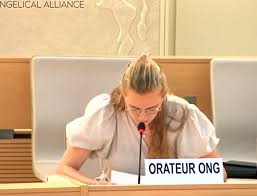Italy urged to broaden religious freedom protections

Rome: Christian groups on Monday (June 30) called on Italy to broaden religious freedoms to protect a wider range of church denominations at the U.N. Human Rights Council (HRC).
The World Evangelical Alliance (WEA) and Italian Evangelical Alliance (Alleanza Evangelica Italiana, or AEE) called on the Italian government to create a Religious Freedom Act in a statement by WEA representative Nadia van der Sar at the HRC’s 59th session in Geneva, Switzerland.
“We call on the Italian government to establish a Religious Freedom Act that does not discriminate against religious minorities and to grant State agreements with the religious communities who have made a request and are waiting for approval,” Van der Sar said on behalf of the WEA and the AEE.
The two evangelical alliances said current regulations make it difficult for non-Catholic bodies to establish places of worship.
“In June 2024, the Court of Cassation overturned two previous legal decisions in favor of the Breccia evangelical church in Rome, establishing that the church building is not a place of worship since there was no altar, no candles and no statues – attributes of Roman Catholic places of worship,” Van der Sar said. “The church has been refused tax-free status and required to pay taxes on a commercial basis.”
One Pentecostal church has sought a location for a house of worship from the municipality of Albano Laziale since 1997, she said. After 15 years of waiting for an answer, the church bought land and applied for a change of “intended use” for a church building to be built. The municipality, despite confirming agreement with the change, continues to ignore the request, Van der Sar said.
The evangelical alliances pointed out that migration and globalization mean that religious communities in Italy are becoming more diverse, and the government needs to recognize a prevalent need for clearer religious freedom laws. In particular, zoning regulations in the country have meant that opening new worship places and retaining buildings for such usages remains “difficult.”
The plea took place amid the HRC’s adoption of Italy’s Universal Periodic Review (UPR). The UPR is a peer review by the HRC of human rights in U.N. member states, occurring every four-and-a-half years.
In Van der Sar’s statement, the evangelical alliances welcomed Italy’s openness to constructively participate in the UPR and “support of recommendations linked to the rights of religious and ethnic minorities.” Both evangelical alliances also called on the government to allow state agreements with religious communities following any request needing approval.
Italy submitted to its last UPR, dubbed the “fourth cycle,” in October, when the review noted that Italy had been advancing “concrete measures” for a national action plan to combat racism, xenophobia and intolerance against ethnic minorities and migrant communities, including Afro-descendants, in order to “promote intercultural understanding and diversity.”
An update by a working group for the UPW on March 18, in anticipation of the HRC 59th session currently underway (June 16-July 11), listed many recommendations for Italy given by other nation states to further human rights.
Points raised encompassed a variety of issues, such as the rights of women and children, journalists and migrants although the states made scant mention of religious rights in their multiple recommendations.
The U.S. called for the repealing of criminal penalties for defamation and blasphemy in Italy, and Pakistan called for enactment and enforcement of laws to “counter racial discrimination, hate speech and incitement to hatred and violence against religious minorities.”
Pakistan was ranked No. 8 on Christian support group Open Door’s 2025 World Watch List 2025 of the countries where it is most difficult to be a Christian.
Bangladesh also encouraged Italy to continue efforts to eliminate all “all forms of discrimination against religious and ethnic minorities, and migrants, and ensure equal opportunities for the enjoyment of economic, social and cultural rights.”
Cameroon, while not mentioning religion specifically, asked Italy to “strengthen the protection of minority rights by ensuring the full integration of these communities in decision-making processes that concern them.”
A number of countries repeated calls for Italy to establish an independent national human rights institution in conformity with the Paris principles, which set out minimum standards for national human rights institutions to meet, to be seen as credible and to operate properly.





